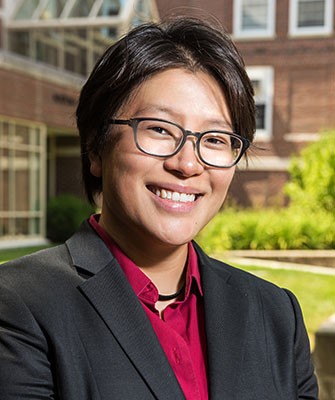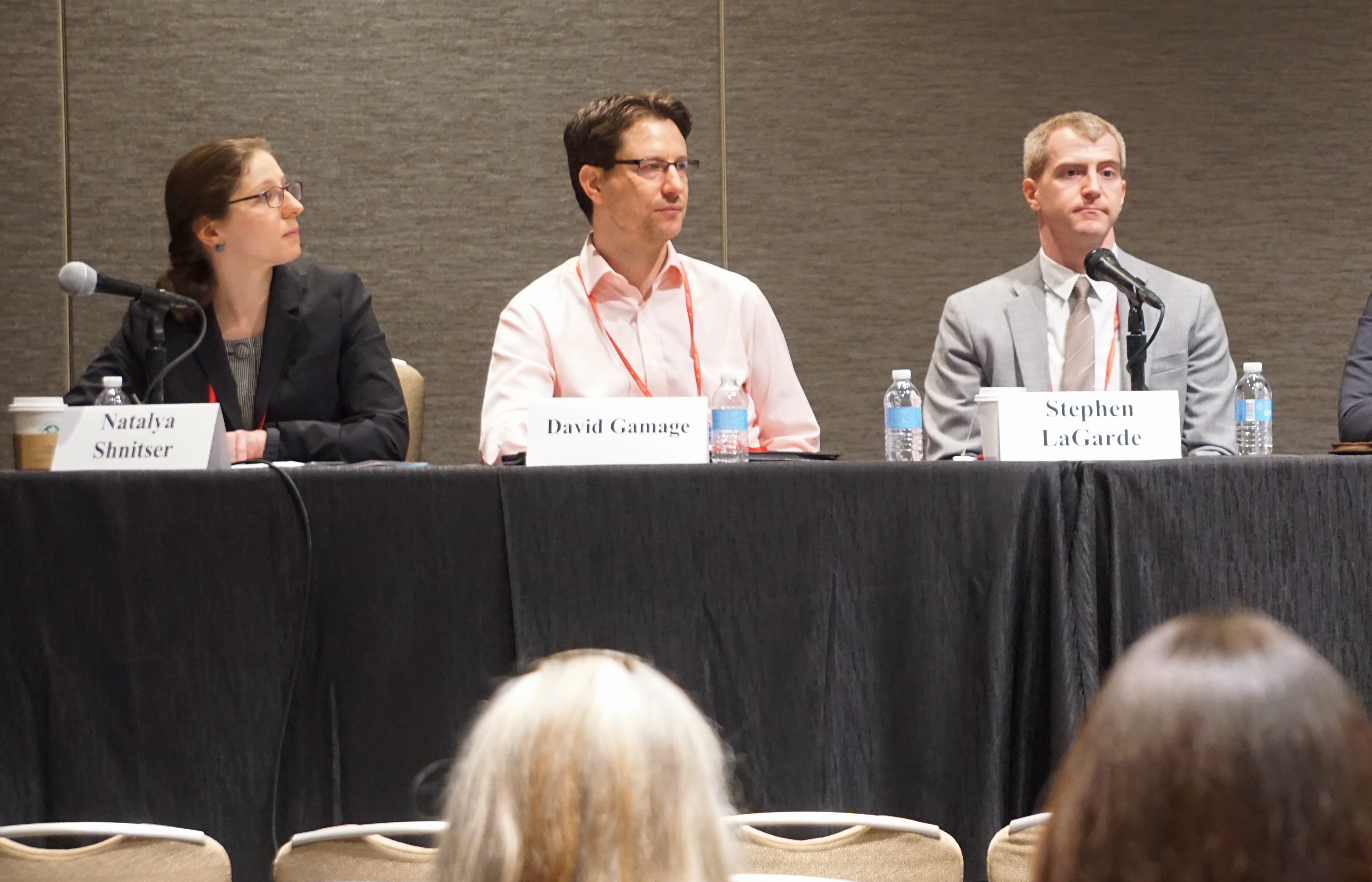By Barbra Elenbaas
AALS Sections provide opportunities for law school faculty and staff to connect on issues of shared interest. Each Section is focused on a different academic discipline, affinity group, or administrative area. Visit AALS Sections for a full list of Sections and information on how to join.
The AALS Section on Taxation promotes the communication of ideas, interests, and activities among members and makes recommendations on matters of interest in the teaching and improvement of the law relating to taxation. AALS News caught up with Larry Zelenak (now Immediate Past Chair) and Shu-Yi Oei (Chair) onsite at the 2018 Annual Meeting in San Diego.
 Immediate Past Chair: Lawrence Zelenak, Duke University School of Law
Immediate Past Chair: Lawrence Zelenak, Duke University School of Law Chair: Shu-Yi Oei, Boston College Law School
Chair: Shu-Yi Oei, Boston College Law SchoolLarry Zelenak: There are around 500 members, which works out to about two or three tax faculty per law school. The core of our membership is a tight group of around one hundred. While there are many people whose interests are not limited just to tax, I don’t think there are many people who are tax dabblers, or who only teach tax occasionally.
Shu-Yi Oei: In general, there are a fair number of us who only teach the traditional tax curriculum. There are also faculty who teach things like corporate finance, business organizations, corporations, regulation and markets—things in the business periphery often get pulled into tax.
Most tax professors have at least a few years of practice experience. Like elsewhere in the academy, increasing numbers have also done a visiting fellowship or have some sort of teaching experience. Some of us came directly out of law practice.
LZ: In general, tax professors have more practice experience than the average non-clinical law professor. My sense is that even if a school put almost no weight on practice experience in other areas, it would value practice experience in tax law. In terms of clinicians, tax clinics are popular and there are many very good people working in that area.
LZ: We were just presented with the biggest change in federal tax law in three decades, which has sort of sucked all the oxygen out of the room. People aren’t talking about much else at the moment. If you consider the last few decades, the leading academic debate in the tax field has been the tax base: whether it should be income or consumption. I think we’ve passed the peak of that conversation. For a long time, it was one pole or the other. Now, there may be an emerging consensus that there is something to be said for being somewhere in the middle. While that has been the big debate of the past, and I don’t think it will ever fully go away, it probably is not the debate of the future.
SO: When we’re not focusing on the new tax reform, there are several other ongoing substantive conversations. Behavioral economics has become a big topic, exploring ideas such as using taxes to incentivize the behaviors you want. You see this in health care or retirement security, for example. How do we adjust defaults to make sure people save for retirement? There is a small but growing conversation about using social science and interview-based approaches to research.
LZ: There is also discussion about progressivity, and using the tax system to transfer money to people rather than take money away from people—the earned income tax credit, for example. And, like everyone else in law schools, we are becoming more interdisciplinary. Much work is being done at the intersection of tax law and behavioral and classical economics. People are using innovative empirical social science techniques—Shu-Yi is one of them. There has also been increased interest in tax history.
SO: We should mention international tax law and cross-border topics, since one of the biggest changes in the tax reform is to cross-border tax rules. Do we tax the worldwide income of multinationals, or do we go territorial and tax income within borders to make sure income doesn’t leak away and hide offshore? There are actually two parallel debates: one in the business context and one in the individual context. A strong subset of our field is considering these questions.
There also exists a significant group of tax scholars who are interested in distributive and social justice. A number of critical scholars are working in the profession and some are melding empirical methods with social justice thinking. This is a longstanding tradition in tax, but my sense is that there is growing interest in these approaches and more willingness to integrate them into mainstream topics.
SO: When you think of the social science discipline that interacts with tax law, it’s traditionally old school, pre-behavioral economics. Methods like interviews or survey methods tend to be less represented. My co-author Diane Ring (Boston College Law School) and I did a study of how rideshare drivers talk about the tax system on internet discussion forums, which also intersects with scholarship on social media. I’m working on another study right now with Leigh Osofsky (University of Miami Law) to interview government counsels who draft tax legislation to see how and why they approach drafting the way they do. It’s a timely paper, and we are starting to see more of these methods being employed.
SO: My sense is that tax contains some of the most interesting distributive justice issues. I think of it sometimes as the law of government extractions and the use of those extractions. Who gets to take what from whom, and how much? How do we use our tax system to give people things—for example, an earned income tax credit or a child tax credit? I think the societal issues in the tax code are very underappreciated and interesting.
LZ: Law professors in general have an amazing appetite for the biggest-picture question possible; this is not unique to tax law. If people want to remain real-world relevant (another thing that we as a group have a lot of appetite for), I think the way to do that in the next few decades is to scale back our issues. This is in response both to where today’s academics are inclined to go anyway, and to what seem to be the relevant policy arenas where conversations are happening. I don’t think we are moving from one big topic to another equally big topic. The kinds of issues coming into play will still be big issues, but they will be smaller than, simply, “Are we going to have an income tax?”
SO: I think we’ll be distracted in the next couple of years with writing about this tax bill. Aside from that, there are several examples of issues that are big but not giant. One is the intersection among technology, privacy, and surveillance, and how they apply to tax administration. There is also cross-border information sharing, and use of idiosyncratic data sources as opposed to systematic data sources. Finally, computerization: should the IRS computerize? What are the risks to doing so? How much does the government know about us? Those are ongoing topics in the cross-border conversation and the domestic conversation.
Another multi-dimensional theme I see poking its head out is tax in the workplace. Everyone wants to talk about robots right now. If robots take over people’s jobs, should we have a universal basic income? Should we tax the robots and use that to give us the universal income? The first question is really automation and what it does to the workplace, and the deeper question is how you provide for humans and what the tax system has to do with it.
Scholars are also focusing in on the impacts of tax law on worker classification. The thought is that workers will have a big incentive to identify as independent contractors. To me, that’s not a new debate; there have been long-standing incentives in both directions. Labor law generally suggests one while tax law suggests the other. I think both questions are about the future of work, human provision, and social insurance.
LZ: One final topic is the cash economy. As the cash economy—I mean literal paper money—dwindles, it’s a godsend for tax enforcement. There’s a real possibility of collecting tax in areas where it was widely thought it would never be possible to effectively collect tax. There are scholars doing interesting work in this area.
SO: It was a very exciting time to teach tax policy. I think it really came alive for the students. By the end of it none of us could keep up—it was just too much information and it changed daily.
LZ: Teaching was easier in some ways and harder in others. It was a bit like trying to dance during an earthquake: In any case, a fairly different experience. If you simply tell students that an issue is controversial, it’s difficult to get them interested because usually the law is what it is and the prospect that the law could be different is nil. This year they were paying attention.
LZ: It will change the substance of what we teach because it changes the substance of the law. Having taught through the change in tax law in 1986, I expect the basic course won’t change all that much. While this bill is a big deal, it doesn’t change the fundamentals of the federal tax system, and I don’t think it will change anything fundamental about my teaching approach. When you’re trying to convince students that some of these issues are policy arguments that matter in the real world, it will be helpful to use 2017 as a recent and high-profile example.
SO: When we all get over the initial reaction to the bill, I think we will realize that international tax law scholars are the ones who will do most of the work.
LZ: It’s a sea change for international tax. For the rest of us, the economic effects are big, but the technical effects for tax lawyers are in the range of what we’re used to dealing with.
SO: As the law percolated along, I started to fully appreciate how many different conversations tax professors are having within the context of this one single bill. There are 500 members of the section. We all read the news. Depending on what news source you’re reading or what Twitter accounts you follow, people are saying wildly different things. The deficit hawks are saying this will blow up the deficit. The people who are worried about distribution are saying this will be highly regressive. Some international people are saying these provisions aren’t so bad. The number of different conversations may have, in some way, altered my approach to thinking about tax policy.
LZ: Throughout the legislative process, there were tax scholars doing a public service by going over the various versions of the bill with an eagle eye. Whatever anyone thinks of the final product, I think it’s substantially better than it would have been otherwise. Many tax law professors, some of them in our section, were the ones pointing out the egregious technical flaws in earlier versions.
 Section on Taxation at the 2018 Annual Meeting
Section on Taxation at the 2018 Annual Meeting
LZ: The National Tax Association’s annual conference has become almost like a second annual meeting for us in terms of having a place to meet other tax law professors. Most of us are not economists, but there’s a lot you can learn as a consumer of tax and economic research without having to be one yourself. Historically, there has been a tendency for tax law professors to be doubly siloed: within law schools but also within tax. Maybe that’s why we’re such a tight group among ourselves. We haven’t traditionally talked a lot to accountants or economists. We are becoming much less siloed in both respects.
Other than that: a lot of email. We mostly use the tax prof listserv rather than our AALS Section listserv, because it was already running before the AALS one existed.
SO: The listserv and the tax prof blog are generally how tax law professors get together outside of the meeting. There’s also the Law and Society Conference, which has a number of tax panels.
LZ: Tax professors are quite supportive in reading other people’s papers and seeing each other at conferences and workshops, but most of this is done outside the section. I think that’s largely because there was never a felt need for our section to provide a formal structure. It was already happening.
Anecdotally, it seems like there is a need for mentorship between and among tax law professors because, often, other law professors at a school do not feel qualified to comment or give criticism on tax law papers. We don’t worry too much about whether this mentorship is being done inside the section or outside of it.
SO: We have a junior tax roundtable for pre-tenured tax people to get together and present work. It moves from school to school each year. I think the field has good structures for supporting scholarship and each other, but it’s not necessarily hosted through the section or relying on AALS for the scaffolding.
SO: One goal is to regroup and reevaluate the state of the tax law at the next Annual Meeting. I look forward to seeing where we are with the tax bill after a year, rather than what we are panicking about right now. Beyond that, I think there are many opportunities to more actively seek out interdisciplinary work with other sections.
Overall, I want to invite other sections and scholars to tax events. Tax is not as scary as it might seem from the outside. There are always people around who are quite happy to talk. The broad policies buried within the technicalities are extremely interesting. We welcome you!